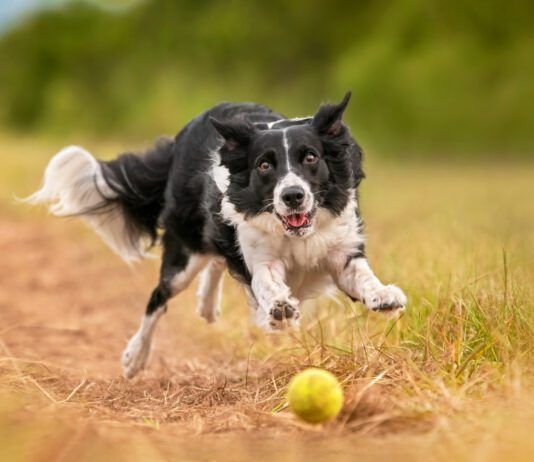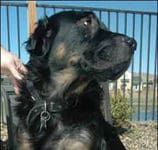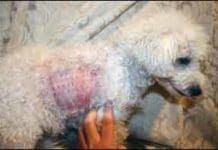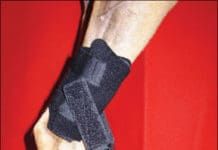Veterinary and Human Medical Centers Collaborate
The Virginia-Maryland Regional College of Veterinary Medicine and Wake Forest University’s Institute for Regenerative Medicine in Winston-Salem, North Carolina, signed an agreement in January to form the Virginia Tech/Wake Forest Center for Veterinary Regenerative Medicine (CVRM). The goal is to facilitate the use of cutting-edge, regenerative (stem cell) treatments for pets and people. Clinical trials performed at the center will provide valuable information concerning the effects of stem-cell therapy.
Canine Allergies: Most Common Causes, Best Tests, and Effective Treatments
Maybe this has happened to you: Youre reading or watching TV or at your computer, and your dog is lying on the carpet near you. Youre absorbed in what you are doing, but all of a sudden, you realize that your dog is licking or chewing himself, or scratching his ear with a hind paw. Hey! you say to your dog. Stop that! Your dog stops, looks at you, and wags his tail. You go back to doing what you were doing and a few minutes later, you hear the tell-tale sounds of licking or chewing or scratching again. Every dog does a certain amount of self-grooming to keep himself clean and every dog owner should be aware of how much is normal, and how much is too much, because too much is often the first indication that a dog is having an allergy attack.
It’s OK to Get a Second Opinion Before Putting Your Dog Through Surgery
Your dog is limping and you don’t know why, so you take him to your veterinarian. The vet pushes, pulls, and palpates and announces that your dog probably has torn ligaments in his knee. She says that he needs surgery, and she can take care of that. While you love your dog’s vet, you’re just not sure that you agree, and you’re also unsure whether surgery is the route you want to take. You feel uncomfortable thinking the thought, but wonder what another veterinarian might recommend.
Behavior Modification for Itchy Dogs
Excessive self-licking and chewing can be caused by a medical issue. It can also be a behavioral problem, a classic example of an obsessive/compulsive disorder. Either way, it's annoying to the dog's human companion, and dangerous to the health of the dog. Here are tips for dealing with dogs who self-lick and chew excessively. To begin behavior modification, determine your dog's stressors and start eliminating them. Make a list of everything?you can think that is stresses your dog even just a little bit, even if the stressors don't seem directly related to the licking. Your list might include thunder, small children, dogs on television, cats, riding in cars, visits to the vet, shock collars, medical issues, and many more. Most owners can identify between 10 and 20 stressors for their dogs.
A Canine Allergy Glossary
An Allergen is defined as a substance that causes an allergic reaction. Anything can be an allergen to a hypersensitive individual, even water. The term has meaning only in relation to an individual who is hypersensitive to that substance.
Other Conditions That Can Cause Your Dog’s Itching
Allergies are not the only reason that dogs itch. In fact, to properly diagnose hypersensitivity, one of the first things a veterinarian needs to do is to rule out other potential causes of itching. Allergies are a diagnosis of exclusion
When It Comes to Allergy Tests, Some Dogs Flunk
There are a few different types of tests available that purport to identify the allergens to which a dog is hypersensitive; some of them are helpful, and some are a waste of time and money. Since all of them are commonly referred to as allergy tests
Food Elimination Trial: A Valuable Tool (When Done Correctly)
A valid food elimination trial for the purpose of confirming food hypersensitivity consists of three phases: elimination, challenge, and provocation. In the first (elimination) phase, the dog is fed a diet consisting of a single protein source and a single carbohydrate source. Both of these ingredients should be completely “novel” to the dog – foods he’s never eaten before. (Thirty years ago, lamb and rice was the go-to food elimination diet, because those ingredients were not yet widely available in commercial pet foods. Because the diet was novel, few dogs had developed allergies to those ingredients, and “lamb and rice” gained an unearned reputation as a “hypoallergenic” diet.
Corticosteroids: Lifesaver or Killer?
There are almost as many opinions among veterinarians concerning the use of corticosteroids as there are veterinarians. Some feel that these drugs – prednisone, prednisolone, methylprednisolone, and dexamethasone foremost among them – are invaluable to every dog who itches; some feel that corticosteroids ought to be used only as a last resort, and only for short periods and in small amounts. Still others regard them as verboten. Why are these drugs so controversial?
Are Heartworms Developing Resistance to Preventatives?
In August 2010, representatives of the American Heartworm Society (AHS), the Companion Animal Parasite Council (CAPC), and experts in the field of nematode resistance met in Atlanta. Their goal was to discuss the possibility of heartworms becoming resistant to macrocyclic lactones
New Treatment for Pituitary-Dependent Cushing’s Disease
A surgical procedure used on humans to remove brain tumors that cause Cushing’s disease is now becoming available to dogs, thanks to collaboration between a human neurosurgeon, a veterinary endocrinologist, and a veterinary surgeon in the Los Angeles area.Cushing’s disease (hyperadrenocorticism, or HAC) is an adrenal disorder common in middle-aged and older dogs, affecting an estimated 100,000 dogs per year in the U.S. It occurs when the body produces too much cortisol, causing increased appetite and thirst, skin problems, and muscle weakness. Cushing’s can also predispose dogs to other conditions such as diabetes, pancreatitis, and infections.
Orthopedic Equipment for Dogs Designed for Increased Mobility and Extra Support
Do you have a dog recovering from orthopedic or neurologic surgery, one who has mobility issues, or a senior dog who has arthritis? If so, at some point, you have probably wished you could do something anything! to help make your dog's life (and your own) a little easier. I asked two veterinarians who specialize in canine rehabilitation to share some of their top picks for canine assistive/rehabilitative equipment. Laurie McCauley, DVM, CCRT, is founder and medical director of TOPS Veterinary Rehabilitation in Grayslake, Illinois, and is considered one of the pioneers in the field of veterinary rehabilitation. Evelyn Orenbuch, DVM, CAVCA, CCRT, recently opened Georgia Veterinary Rehabilitation, Fitness and Pain Management in Marietta, Georgia, and has focused on veterinary rehab medicine since 2003.















